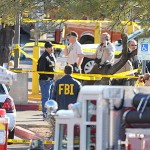How SCOTUS Handcuffed the Gun Rights Debate
 The Tucson shootings may have Americans reconsidering our gun laws, but our leaders will find it harder to draft policies to respond to such events.
The Tucson shootings may have Americans reconsidering our gun laws, but our leaders will find it harder to draft policies to respond to such events.
The murder of six, including a federal judge and a nine-year old girl, in the attempted assassination of a talented young Congresswoman is a startling reminder of why the Supreme Court ought to, and usually does, avoid so called “political questions.” If ever an event will spur a thoughtful and productive debate on the costs and virtues of firearms, this event is it. Yet the Supreme Court’s decision in DC v. Heller denies society the ability to think and rethink the way that it polices firearms. Or put another way, it constrains societies ability to rebalance the perpetual scale, with freedom on one side, and restraint on the other.
The majority got DC. v. Heller very wrong, and not because they came to the wrong conclusion but because there is no way of determining whether they reached the right conclusion or not. Anyone that reads Justice Scalia’s majority opinion in that case, or Justice Stevens’ dissent, will be struck by the strength of the arguments they both put forward for their views. Scholars have been divided for decades as to whether the 2nd Amendment created a collective or individual right, and all that we really can say for sure is that lots of smart people disagree with the majority's holding.
Two conservative (and brilliant) judges, Judge Richard Posner and Judge J. Harvie Wilkinson, took to the press to side with Justice Stevens. This is not evidence that they are correct in the historical sense, it merely demonstrates that we do not know the right answer for sure and that, therefore, the Supreme Court ought to have continued to allow democratically elected leaders deal with how to regulate gun rights. D.C.'s gun laws probably did go too far, but events like the Giffords shooting remind us all that there very well may be good reasons for doing so.
Given the lack of clarity as to whether the 2nd Amendment guarantees an individual or collective right to keep and bear arms, the Court ought to have left the question open for debate. In choosing not to do so, the Supreme Court inhibited the ability of the democratic process to respond to events like the Tucson massacre. Rather than having a real debate on the merits of gun rights, the Heller decision ensures that society is less likely to have the periodic debates on the merits of gun control that should happen as conditions swing back and forth over time.
Follow Jeb on twitter: @JGolinkin